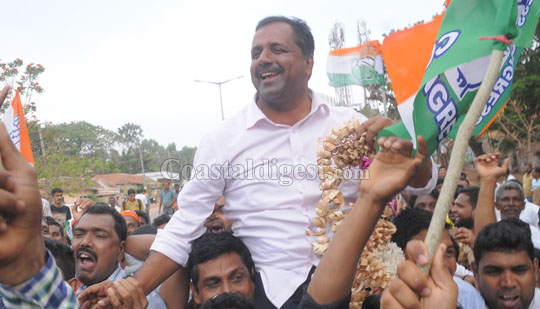Mangaluru, Feb 23: Expressing disappointment over Congress party's performance in Zilla and Taluk Panchyat polls in coastal Karnataka, UT Khader, health and family welfare minister, said that he and other party leaders would a self-introspection over the results.
“I am disappointed. But, we (Congress leaders) accept people's mandate,” Mr Khader told media persons in the city after the announcement of poll results.
However, he pointed out that in his Mangluru constituency Congress won 12 out of 16 taluk panchayat seats. “We have won Mangaluru and Bantwal taluk panchayats. We will fulfil the promises we made to the people during election campaign,” he said.
He said that all the Congress MLAs and ministers from coastal Karnataka will sit and do deep introspection on what went wrong in the recently concluded elections. “We will take all the party workers to confidence,” he added.
Also Read:
Congress wrests Mangaluru, Bantwal Taluk Panchayats from BJP
Udupi: BJP sweeps Zilla Panchayat, all 3 Taluk Panchayats; Cong suffers blow
BJP wins Dakshina Kannada Zilla Panchayat: ZP/TP results at a glance
Karnataka ZP, TP polls: Congress leads, BJP second, JD(S) third





Comments
Only modi and his chamcha can bring back black money to india. Hahaha
- lACK OF GOOD PARTY LEADERSHIP - NEED A DYNAMIC DISTRICT PRESIDENT.
- MINORITIES ARE LOOSING THEIR FAITH ON CONGRESS FOR FAILING TO CURB GOONDASM OF SANGHA PARIWAR IN THE DISTRICT.
- LEADERS GROUPISM . THERE ARE MANY GROUPS AND THE MINISTERS AN
Congress will loose all seats in coming election. All MLA MP seats will goes to BJP.
Siddu will be the last CM for congress.
Add new comment